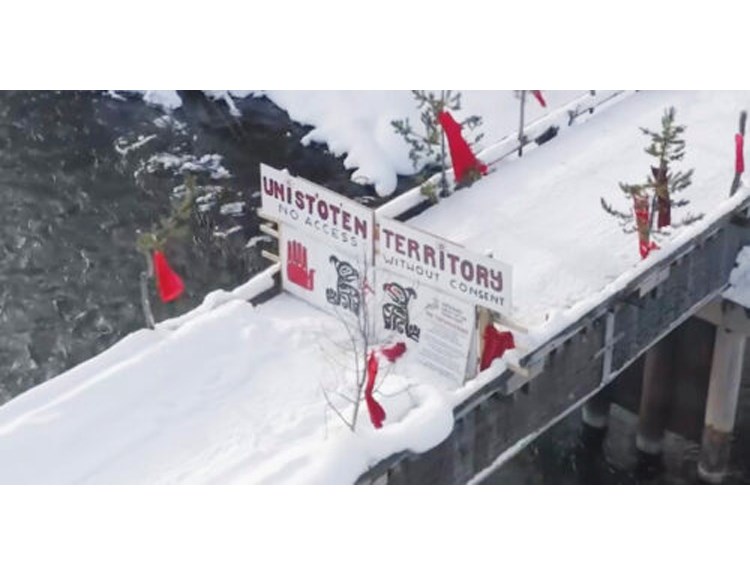The RCMP has finished removing the blockade on Morice West Forest Service Road and reopened the road, located southwest of Houston.
Starting on Thursday, the RCMP began enforcing a B.C. Supreme Court injunction against people interfering with construction of the 670-kilometre Coastal GasLink pipeline in the area. The $6.6 billion natural gas pipeline will feed the $40 billion liquefied natural gas export terminal under construction by LNG Canada in Kitimat.
On Jan. 3, a group of eight of 13 Wet'suwet'en hereditary chiefs and members of the Unist'ot'en camp issued an "eviction notice" to workers at camp 9A and the surrounding area. All five elected band councils of the Wet’suwet’en support the project and have signed benefits agreements worth more than $300 million.
On Thursday, the RCMP arrested four people in the area, followed by six on Friday and 11 on Saturday. Another seven people were arrested Monday morning, when police reached the final barricade on the Morice River Bridge at the 66-km mark of the forest service road, a police statement said.
"For approximately two hours, attempts were made to have the barricade gate opened by those who placed it there, and the court-ordered injunction was read to the individuals who were present at the scene on the other side of the bridge past the barricade," the RCMP statement said. "Coastal GasLink employees were able to remove the barricade gate from the Morice River Bridge, allowing vehicles and foot traffic across the bridge."
Once the barricade was removed, officers gave the people on the other side the opportunity to leave voluntarily or be arrested for breaching the court injunction, the RCMP statement said.
"A total of seven individuals were arrested for breaching the court-ordered injunction," the statement said. "No use of force was used, and no injuries resulted from the arrests. Once CGL has confirmed the road and infrastructure are deemed safe and ready for full access, the temporary exclusion zone and access control point that the RCMP has put in place on the Morice West Forest Service Road will be removed."
Twenty of the 21 people arrested over the weekend were released without charge, on condition they abide by the court injunction. One person arrested Saturday was released after agreeing to a future court date.
On Tuesday at 3:45 p.m. the RCMP ended its temporary exclusion zone along the road and reopened it to the public.
"I am very satisfied that this operation was conducted safely and there were no injuries sustained by anyone," RCMP senior commander Chief Superintendent David Attfield said in a press release.
"The right to peaceful, safe and lawful protest, and freedom of expression, are important parts of Canada's democracy. However, blocking roadways is both dangerous and illegal," an RCMP statement issued on Tuesday added. "While we respect the right to demonstrate peacefully, police of local jurisdiction will enforce the law with sensitivity. The Community Industry Safety Office which has been on the Morice West Forest Service road since January 2019 will remain in and the RCMP will continue patrols of the corridor to ensure everyone's safety."
Wet'suwet'en hereditary Chief Na'moks, who also goes by John Ridsdale, did not return calls to The Citizen.
However a statement published on the Unist'ot'en website on Monday said the group plans to continue to fight. The statement said Freda Huson (Chief Howihkat), Brenda Michell (Chief Geltiy), Dr. Karla Tait, Victoria Redsun, Autumn Walken and Pocholo Alen Conception were arrested.
"Unist’ot’en condemns these violent, colonial arrests and stark violations of Wet’suwet’en law, Canadian law, and of the United Nations Declaration on the Rights of Indigenous Peoples (UNDRIP)," the statement said. "We have the strength of our ancestors within us. We have the solidarity of our Indigenous relatives and allies with us. We have the power of people shutting down railways, highways, ports, and government offices all around this country.... This is not over."
In a statement issued on Tuesday, Coastal GasLink said the company still hopes to find a long-term solution.
"We are extremely disappointed enforcement was required to re-open the Morice (West) River Forest Service Road but will redouble efforts to engage with the Hereditary Chiefs of the Wet’suwet’en and with the Unist’ot’en in search of a peaceful, long term resolution that benefits the Wet’suwet’en people," the company statement said. "Coastal GasLink recognizes the benefits the Healing Center provides to members of the Wet’suwet’en community and will continue to support its operation by doing all we can to ensure the safety of those staying at the Center."
The company says it will continue to honour terms of the access agreement the company and Wet'suwet'en chiefs had previously negotiated, including limiting speed around the healing centre, and providing advance notice before workers cross the bridge.
"This week will see the recommencement of construction activities in Wet’suwet’en territory and the return to work of many members of the Wet’suwet’en community," the company statement said. "Members of the Wet’suwet’en community will be heavily involved in the upcoming Spring and Summer construction programs and the coming years as the project advances."
The B.C. Civil Liberties Association and Union of BC Indian Chiefs have filed a complaint to the Chairperson of the Civilian Review and Complaints Commission regarding the large exclusion zone created by the RCMP during the course of the arrests.
Civil liberties association executive director Harsha Walia said the RCMP exceeded the authority given to them by the B.C. Supreme Court injunction and enforcement order.
"The exclusion zone is outside the bounds of the injunction," Walia said. "This is unprecedented in terms of legal precedent. It's the RCMP giving themselves these policing powers."
The discovery that a bridge was tampered with, spikes and logs were laid in the road, etc. doesn't justify shutting down 60 kilometres of road and restricting people's basic right to travel, she said.
"This is not something we would accept in our cities," Walia said.
Union of BC Indian Chiefs Grand Chief Stewart Phillip did not return calls to The Citizen.



